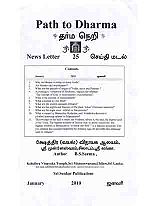"தர்ம நெறி 2010.01" பக்கத்தின் திருத்தங்களுக்கிடையேயான வேறுபாடு
நூலகம் இல் இருந்து
சி (6586) |
|||
| (5 பயனர்களால் செய்யப்பட்ட 6 இடைப்பட்ட திருத்தங்கள் காட்டப்படவில்லை.) | |||
| வரிசை 5: | வரிசை 5: | ||
வெளியீடு = ஜனவரி [[:பகுப்பு:2010|2010]] | | வெளியீடு = ஜனவரி [[:பகுப்பு:2010|2010]] | | ||
சுழற்சி = மாதமொருமுறை | | சுழற்சி = மாதமொருமுறை | | ||
| − | இதழாசிரியர் = | + | இதழாசிரியர் = B. Sarma | |
மொழி = தமிழ் | | மொழி = தமிழ் | | ||
பக்கங்கள் = 9 | | பக்கங்கள் = 9 | | ||
| வரிசை 11: | வரிசை 11: | ||
=={{Multi|வாசிக்க|To Read}}== | =={{Multi|வாசிக்க|To Read}}== | ||
| − | * [http://noolaham.net/project/66/6586/6586.pdf தர்மநெறி 25 (1.08 MB)] {{P}} | + | * [http://noolaham.net/project/66/6586/6586.pdf தர்மநெறி 2010.01 (25) (1.08 MB)] {{P}} |
| + | |||
| − | |||
[[பகுப்பு:2010]] | [[பகுப்பு:2010]] | ||
| − | [[பகுப்பு: | + | [[பகுப்பு:தர்ம நெறி]] |
| + | <!--ocr_link-->* [http://noolaham.net/project/66/6586/6586.html தர்ம நெறி 2010.01 (எழுத்துணரியாக்கம்)]<!--ocr_link--> | ||
| + | |||
| + | =={{Multi| உள்ளடக்கம்|Contents}}== | ||
| + | *Why do Hindus worship so many Gods? | ||
| + | *Are Hindus idol worshippers? | ||
| + | *What are the periods of origin of Vedas, epics and puranas? | ||
| + | *According to viewpoint of Hinduism, explain the whether ‘ The concept of God’ is monotheistic or polytheistic? | ||
| + | *What is the process of reincarnation? | ||
| + | *What is karma in very brief? | ||
| + | *What are the sixteen sanskars (rituals)? | ||
| + | *What are the significant features of the plant ‘tulasi’ (Ocimum sanctum) ? | ||
| + | *What are the eight rasas referred in Natyasastra? | ||
| + | *What is meant by Bhaumika, Kudyaka, and Urddhvka decorative (chithra) painting referred in Silpasastra? | ||
| + | *‘Knowledge of the self is really the Vedanta, which is, the end, the highest goal of the Veda.The highest wisdom of Greece was ‘to know ourselves;’ the highest wisdom of Hinduism is ‘to know our self’. Is a famous quotation. Can you explain this concept simplified by ordinary age old proverbs like language used in villages? | ||
03:51, 31 ஆகத்து 2021 இல் கடைசித் திருத்தம்
| தர்ம நெறி 2010.01 | |
|---|---|

| |
| நூலக எண் | 6586 |
| வெளியீடு | ஜனவரி 2010 |
| சுழற்சி | மாதமொருமுறை |
| இதழாசிரியர் | B. Sarma |
| மொழி | தமிழ் |
| பக்கங்கள் | 9 |
வாசிக்க
- தர்மநெறி 2010.01 (25) (1.08 MB) (PDF வடிவம்) - தரவிறக்கிக் கணினியில் வாசியுங்கள் - உதவி
- தர்ம நெறி 2010.01 (எழுத்துணரியாக்கம்)
உள்ளடக்கம்
- Why do Hindus worship so many Gods?
- Are Hindus idol worshippers?
- What are the periods of origin of Vedas, epics and puranas?
- According to viewpoint of Hinduism, explain the whether ‘ The concept of God’ is monotheistic or polytheistic?
- What is the process of reincarnation?
- What is karma in very brief?
- What are the sixteen sanskars (rituals)?
- What are the significant features of the plant ‘tulasi’ (Ocimum sanctum) ?
- What are the eight rasas referred in Natyasastra?
- What is meant by Bhaumika, Kudyaka, and Urddhvka decorative (chithra) painting referred in Silpasastra?
- ‘Knowledge of the self is really the Vedanta, which is, the end, the highest goal of the Veda.The highest wisdom of Greece was ‘to know ourselves;’ the highest wisdom of Hinduism is ‘to know our self’. Is a famous quotation. Can you explain this concept simplified by ordinary age old proverbs like language used in villages?